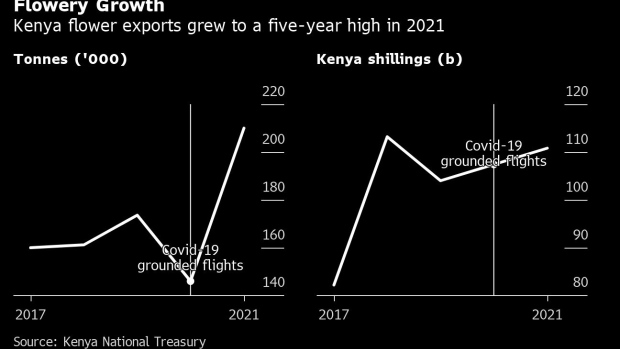May 6, 2022
Russia’s War Is Boosting Flower Prices as Demand Remains Robust
, Bloomberg News

(Bloomberg) -- Rising demand for flowers even as Russia’s war on Ukraine curtails production has helped horticulturists in Kenya, Africa’s top grower, boost prices.
Kenya’s shipments in 2022 will likely exceed last year’s 110.8 billion shillings ($954 million), according to the Kenya Flower Council. Higher prices, a stronger dollar and euro will boost the East African nation’s earnings and “cushion farmers” even after output expectedly falls, said the industry lobby’s chief executive, Clement Tulezi.
Russia’s invasion of Ukraine has stalled fertilizer supplies thereby hurting production of flowers from roses to lilies. In Europe, an energy crisis has hit greenhouse operations, according to Royal FloraHolland, which runs three auctions in the Netherlands. While output has suffered, gradual opening up of the world economy and celebrations such as this weekend’s Mother’s Day have buoyed demand.
Kenya and Ethiopia are the main suppliers of flowers to Europe, while Colombia and Ecuador are the biggest exporters to North America. The Netherlands is the largest hub of flower trade globally.
While sales are unlikely to match last year’s in Europe, they will still be significant, according to FloraHolland which saw record revenue of of 5.6 billion euros ($5.8 billion) in 2021.
“So far the demand is not dropping,” FloraHolland spokesman Michel van Schie said by email. “The products that normally would go to Russia, Ukraine and Belarus” are finding their way to other markets, he said.
Mother’s Day, which will be celebrated in more than 90 countries on Sunday, is the second-highest sales period for Kenyan flowers. It accounts for about a quarter of the annual income, while Valentine’s Day makes up about 35%.
Demand is better this year and the strengthening of the dollar and the euro will yield solid earnings, Tulezi said in a phone interview. Volumes will be hit by a shortage of fertilizer -- its cost has climbed by as high as 50%.
Kenya’s horticulture industry, one of its biggest sources of foreign currency, is recovering from the coronavirus pandemic, during which farmers dumped tons of flowers as planes were grounded amid lockdowns around the world. Authorities in Nairobi have allowed Ethiopian Airlines Group and Saudi Arabian Airlines to deploy additional cargo flights to meet extra demand for flowers for Mother’s Day, Tulezi said.
“We have good freight capacity this year, the deficit is smaller,” Tulezi said. Kenya’s weekly freight demand in the current season averages 3,800 tons compared with available capacity of about 3,400 tons, he said.
Airfreight charges have more than doubled to between $5.20 and $5.50 per kilogram, compared with an average $2.40 last year, Tulezi said. That, coupled with expensive fertilizer, may further boost prices.
©2022 Bloomberg L.P.






